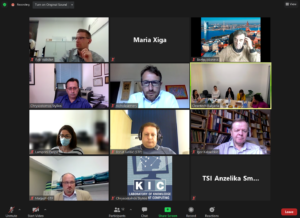The recent OECD report on “Teachers and Leaders in Vocational Education and Training” focuses on initial education and continuous professional development of Vocational Education and Training (VET) teachers, innovative pedagogical approaches in VET during the digital age, and the role of school leaders of VET institutions.
The study shows that the rapidly changing labour markets call for changes in VET teaching and leadership. The skills and competence required from VET teachers are therefore becoming more complex. The COVID-19 pandemic had a major shift in digitalising VET. However, while VET teachers in Denmark and Germany reported that they were able to smoothly shift to distance teaching as they were already prepared before the pandemic, teachers in other countries faced more difficulties.
According to the report, 53% of further education college principals had found teacher recruitment difficult over the last three years. Germany, for example, estimates that the number of VET teachers will represent around 80% of the demand in the coming decade. In Sweden, the supply of new VET teachers is estimated to be less than half of the demand in the next 10 years. Besides, the report findings show that in many countries, such as in Italy, Finland, Lithuania, and Latvia the VET teachers are over 50 years old.
One of the impacts of the ageing teacher population and of the fact that the profession is seen as unattractive is that, in some countries, the costs of VET provision and the use of lower or less-qualified teaching staff has increased. This creates a decline of the quality of the VET teaching. Indeed, in mostly all the European countries, VET teachers are more likely to have fixed-term contracts than teachers in other education sectors. According to the report, in Portugal, Belgium, Italy, Spain and Greece more than 80% of VET teachers with temporary position were not able to find a permanent job. Additionally, average VET teachers’ salaries are 8% less than those of teachers in general education and 60% of VET teachers declared not to be satisfied with their job.
The OECD recommends to national governments, among other recommendations, to increase the attractiveness of teaching careers in VET, provide flexible pathways into VET teaching, foster VET teachers’ capacity to use innovative pedagogy, raise awareness of the importance of innovation, ICT and soft skills in teaching in VET and improve the attractiveness of the VET leadership role. ETUCE does not agree with the recommendation about deregulation of the teaching profession by attracting unqualified professional staff to teaching. National legislation on teaching qualifications must be respected. At the same time the profession should be made more attractive to young teachers by ensuring good salary and decent working conditions to them.
ETUCE underlines that education trade unions have been fighting to guarantee decent working conditions for VET teachers as well as the attractiveness and the quality of the VET sector. In the framework of the project ‘Lifelong Learning for All: Social Partners in Education promoting quality and inclusive VET to enhance lifelong learning for all’ in which ETUCE is a partner, in June 2021, ETUCE member organisations will have the opportunity to participate in a peer learning activity focusing on VET in Germany. The event will be the occasion to gain in-depth insights on the German VET sector and discuss the main issues of the VET sector with other social partners from across Europe.
Read more:
OECD Report Teachers and Leaders in Vocational Education and Training






